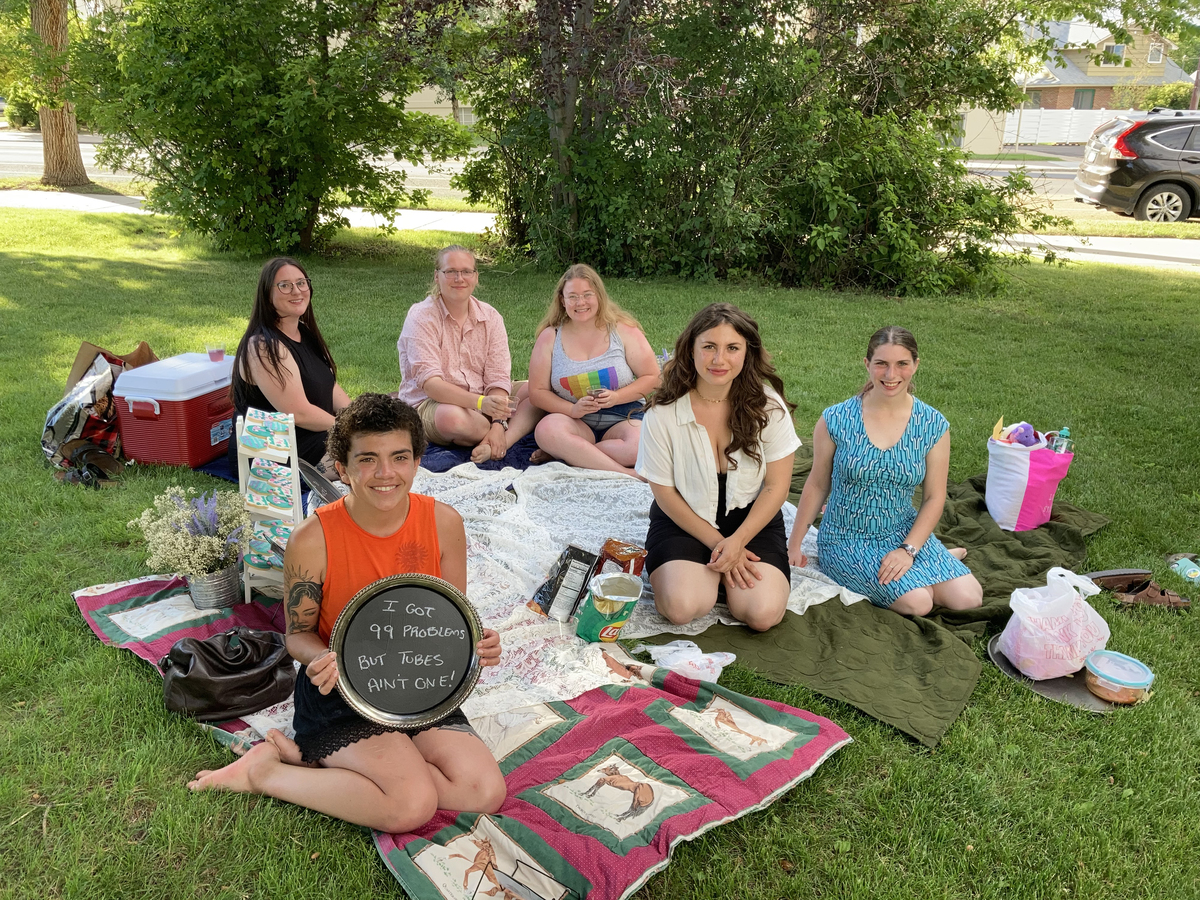[ad_1]
Dani Marietti’s “sterilization bathe” in Helena, Montana, options cookies with abortion-rights slogans, equivalent to “My Physique, My Selection,” written on them in frosting.
Ellis Juhlin/Yellowstone Public Radio
conceal caption
toggle caption
Ellis Juhlin/Yellowstone Public Radio

Dani Marietti’s “sterilization bathe” in Helena, Montana, options cookies with abortion-rights slogans, equivalent to “My Physique, My Selection,” written on them in frosting.
Ellis Juhlin/Yellowstone Public Radio
In July, a handful of individuals gathered within the shade of a giant pine tree in Helena, Montana for a going-away occasion of kinds.
Their buddy, Dani Marietti, was going to have her fallopian tubes eliminated.
It was a call she had made after a draft of the U.S. Supreme Court docket’s choice to overturn the constitutional proper to abortion was leaked to the press.
The small group kicked off the “sterilization bathe” for the 25-year-old by laying out chalk-written indicators that mentioned “See Ya Later Ovulater” and “I acquired 99 issues however tubes ain’t one.” They munched on cookies that had abortion-rights slogans, equivalent to “My Physique, My Selection,” written on them in frosting.
Marietti is a full-time graduate scholar in Helena working towards turning into a therapist. She does not need children to get in the best way of her profession. She had thought-about everlasting sterilization earlier than, however the chance that the Supreme Court docket would overturn Roe v. Wade pushed her to hunt out an OB-GYN who would assist her with a everlasting methodology of contraception.
“‘I wish to do that as quickly as potential,'” she recalled telling the physician.
“I at all times knew I did not need kids, and naturally once you say that as a youthful particular person, everyone seems to be like, ‘Oh, you may change your thoughts,’ or, ‘Simply wait till you discover the one,'” Marietti says. “I at all times sort of ignored that.”
Docs see rising demand for sterilization
Abortion remains to be authorized in Montana, however whether or not it can stay so is unclear.
State Lawyer Normal Austin Knudsen, a Republican, has asked the Montana Supreme Court to overturn its 1999 choice that mentioned the state structure’s proper to privateness contains the fitting to finish a being pregnant.
The uncertainty round abortion entry in Montana and different states the place abortion is now or may turn into unlawful, plus the concern of future authorized fights over long-term contraception, has seemingly spurred an increase within the variety of folks searching for surgical sterilization, in line with stories from docs. That features Marietti, who’s having a salpingectomy — a process through which the fallopian tubes are eliminated as a substitute of tied, as in tubal ligation, which could be reversible.
How many individuals sought everlasting sterilization after the autumn of Roe will not turn into clear till subsequent 12 months, says Megan Kavanaugh, a researcher for the Guttmacher Institute, which gathers knowledge associated to reproductive well being care throughout the U.S. and helps abortion rights.
However anecdotal stories point out that extra folks have been present process everlasting contraception procedures for the reason that Supreme Court docket’s June 24 choice in Dobbs v. Jackson Ladies’s Well being Group, which struck down Roe.
Dr. Kavita Arora, who chairs the American Faculty of Obstetricians and Gynecologists’ Committee on Ethics, says suppliers throughout the nation are starting to see an inflow of sufferers into their working rooms.
Arora, an OB-GYN in North Carolina, recounted what considered one of her sufferers mentioned simply earlier than a current surgical procedure: “She needed to have autonomous management over her physique, and this was her manner of making certain she was the one that acquired to make the selections.”
Extra adults of their 20s and 30s with out kids are coming to the hospital for sterilization consultations, says Dr. Marilee Simons, an OB-GYN at Bozeman Well being Deaconess Hospital in Montana.
Many are ladies who already use long-term contraception choices, however “they’re nonetheless fearful about an unintended being pregnant and what which may imply sooner or later,” she says.
Most are asking to have their tubes eliminated to completely forestall being pregnant. A smaller variety of persons are asking for hysterectomies, which surgically take away half or all the uterus. To satisfy demand, Bozeman Deaconess has devoted at the very least one supplier to work with these sufferers a number of days per week.
Deliberate Parenthood of Montana President and CEO Martha Fuller says clinics statewide have seen an “unprecedented” improve in sufferers asking to be sterilized, together with requests for vasectomies.

Dani Marietti (holding signal) and her pals collect for a “sterilization bathe” in Helena, Montana, in July earlier than Marietti was scheduled to have her fallopian tubes surgically eliminated.
Ellis Juhlin/Yellowstone Public Radio
conceal caption
toggle caption
Ellis Juhlin/Yellowstone Public Radio

Dani Marietti (holding signal) and her pals collect for a “sterilization bathe” in Helena, Montana, in July earlier than Marietti was scheduled to have her fallopian tubes surgically eliminated.
Ellis Juhlin/Yellowstone Public Radio
Sufferers face obstacles
However some folks searching for sterilization procedures throughout the U.S. are being turned away.
Arora says sufferers who haven’t got kids and are of their childbearing years are reporting difficulties discovering physicians prepared to sterilize them. Their reluctance may stem from studies that counsel sufferers who’re sterilized at age 30 or youthful are about twice as seemingly as these over 30 to precise remorse after getting the process. However, other studies had combined outcomes and located that some ladies really feel much less remorse over time.
Some sufferers who’ve been denied sterilizations have turned to therapists like Barbara DeBree, who has a personal observe in Helena and writes letters to suppliers testifying that the sufferers have thought by their choices. “This isn’t a fast choice for them,” DeBree says.
Value and insurance coverage protection can be points for sufferers searching for sterilization procedures.
Helena resident Alex Wright, 23, does not plan to have kids and needs to be sterilized.
She plans to schedule a session to see whether or not her supplier will carry out the process. If her common supplier will not do it, she says she’s going to search out somebody from on-line lists of suppliers who’re prepared to carry out the process on youthful folks.
“That is solely useful if I can get the monetary help to get it taken care of by these folks,” she says. Wright says her insurance coverage firm estimates she’ll pay about $4,000 out-of-pocket if she goes with an in-network supplier. Utilizing an out-of-network physician may value considerably extra.
Some concern future “assaults on contraception”
Though some persons are searching for everlasting procedures in response to the Dobbs choice, others are doing so as a result of they imagine the U.S. Supreme Court docket will proceed upending reproductive well being norms.
Kavanaugh, the researcher at Guttmacher, says Justice Clarence Thomas opened that door by suggesting in his concurring opinion in Dobbs that different precedents ought to be revisited, together with the 1965 Griswold v. Connecticut choice that claims banning contraceptives violates a married couple’s proper to privateness.
“I believe we’re anticipating that there is going to be some assaults on contraception,” Kavanaugh says.
That is what worries Shandel Buckalew, of Billings, Montana, who desires a full hysterectomy.
The 31-year-old says her physician thinks she has endometriosis, a painful situation through which tissue that usually grows contained in the uterus grows on different elements of the reproductive organs. Buckalew hasn’t undergone the full range of testing that can be required for a diagnosis as a result of she does not have medical health insurance and may’t afford it.
“Though I’ve an IUD [intrauterine device], the quantity of cramps and the ache I’m going by — oh, I get so sick,” she says.
Buckalew hopes a hysterectomy will alleviate that ache, along with offering everlasting contraception as a result of she does not need children. However her lack of medical health insurance makes the process unaffordable.
She’s making an attempt to get medical health insurance earlier than her IUD expires in two years, as a result of she fears the reproductive well being care panorama may shift dramatically.
“It seems like my life does not matter,” she says.
KHN (Kaiser Well being Information) is a nationwide newsroom that produces in-depth journalism about well being points. Along with Coverage Evaluation and Polling, KHN is among the three main working packages at KFF (Kaiser Household Basis). KFF is an endowed nonprofit group offering data on well being points to the nation.
[ad_2]
Source link













